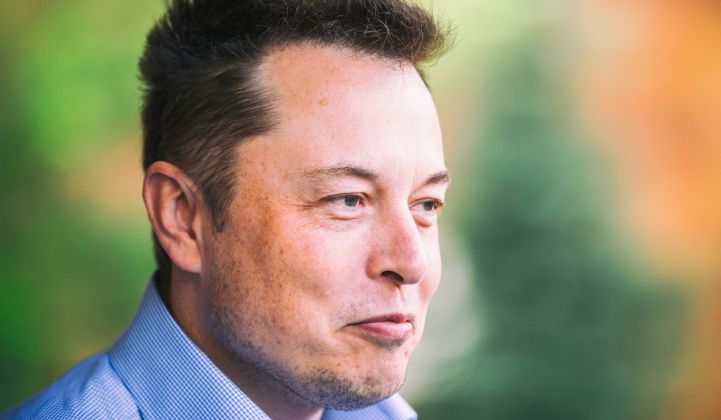How can Tesla and its CEO Elon Musk save the world if it has to reveal its business plans to the SEC and Wall Street analysts? Musk has a solution to that: take Tesla private.
Musk let the world know via Twitter on Tuesday that he's looking to shift his $60 billion market cap EV pioneer from a public to private company. At market close, Tesla's market cap stood at $63.87 billion.
The mysterious tweet sent out this morning read: "Am considering taking Tesla private at $420. Funding secured." Tesla's stock jumped, triggering a halt for an hour or so before trading resumed at about $380.
A $420 price, a number seemingly plucked from a frat boy stoner fantasy, is 22 percent over Monday’s closing stock price and would be the biggest leveraged buyout in history — with a value of about $82 billion counting debt. Musk would have to come up with $66 billion, according to Bloomberg.
Am considering taking Tesla private at $420. Funding secured.
— Elon Musk (@elonmusk) August 7, 2018
One would imagine the Securities and Exchange Commission will be taking a look at Elon's announcement, its timing and its impact on stock price — since Tesla did not file an 8-K form. The SEC 8-K form is required because firms listed on a U.S. stock exchange "are responsible for notifying the listing exchange about any corporate developments that could affect trading in its stock — and it must do so before announcing the news to the public."
Musk's tweet followed reports in The Financial Times that Saudi Arabian prince Mohammed bin Salman's Public Investment Fund had bought a stake of up to 5 percent (worth about $2 billion) in Tesla with shares purchased on the secondary market.
After sending his tweet to the world, Musk then let his employees know what was going on in a letter titled, "Taking Tesla Private." The letter reads:
Earlier today, I announced that I'm considering taking Tesla private at a price of $420/share. I wanted to let you know my rationale for this, and why I think this is the best path forward.
First, a final decision has not yet been made, but the reason for doing this is all about creating the environment for Tesla to operate best. As a public company, we are subject to wild swings in our stock price that can be a major distraction for everyone working at Tesla, all of whom are shareholders. Being public also subjects us to the quarterly earnings cycle that puts enormous pressure on Tesla to make decisions that may be right for a given quarter, but not necessarily right for the long-term. Finally, as the most shorted stock in the history of the stock market, being public means that there are large numbers of people who have the incentive to attack the company.
I fundamentally believe that we are at our best when everyone is focused on executing, when we can remain focused on our long-term mission, and when there are not perverse incentives for people to try to harm what we're all trying to achieve. This is especially true for a company like Tesla that has a long-term, forward-looking mission.
On Wednesday, as criticism of Musk's actions mounted, members of Tesla's board of directors released the following statement: "Last week, Elon opened a discussion with the board about taking the company private. This included discussion as to how being private could better serve Tesla’s long-term interests, and also addressed the funding for this to occur. The board has met several times over the last week and is taking the appropriate next steps to evaluate this."*
Financial markets react to the notion of a private Tesla
Dan Primack of Axios tweets: "One of two things is true right now: Elon Musk has quietly pulled a huge coup, and secured enough financing to buy his company at a premium. 2. Elon Musk doesn't have the financing, and the SEC is going to crush him for it."
According to Gene Munster of VC firm Loup Ventures, going private “makes a ton of sense” for the EV builder. “Elon Musk does not want to run public companies."
*This story was updated to include a statement from Tesla's board.




